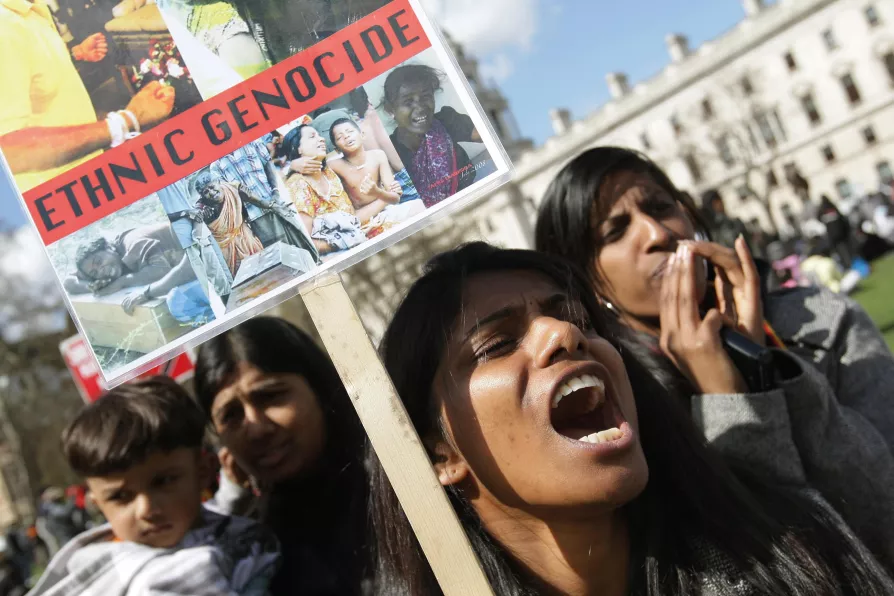As the government quietly upgrades the role of Britain’s special forces, their growing global footprint and near-total exemption from democratic oversight should alarm us all, says ROGER McKENZIE

 IGNORED: Tamils in Parliament Square call on the British government to demand an immediate ceasefire in Sri Lanka during the 2009 genocide
IGNORED: Tamils in Parliament Square call on the British government to demand an immediate ceasefire in Sri Lanka during the 2009 genocide
MAY 18 2024, marked the 15th anniversary of the Mullivaikkal massacre in Sri Lanka, the culmination of a genocide in which tens of thousands of innocent Tamils were massacred at Mullivaikkal, mostly women and children, bombed and shelled as they were held in a tiny area by troops and a Sri Lankan government that demonstrated utter contempt even for respected international institutions, including the UN and the Red Cross, whose buildings were also targeted.
The perpetrators showed the same contempt for international law against the shelling of hospitals and the killing of the sick and wounded. The UN panel that investigated the mass murder called it “a grave assault on the entire regime of international law.”
As many as 70,000 Tamil civilians were killed over a few months according to UN figures, but the International Truth and Justice Project’s analysis of census records suggest the murder toll was almost 150,000. Children were taken hostage, abused, threatened and forced to fight.
Many more were maimed and traumatised, as the population was trapped in Mullivaikkal and not permitted to leave, forced to endure the horrors inflicted on them by a land-greedy regime that coveted the Tamil birthright and had no qualms about committing the greatest of war crimes to get hold of it. Even those who surrendered under a white flag were murdered.
The oppressors’ apparent aim was not just to seize land that was not theirs — it was the eradication of a rich culture and heritage that was perceived as an obstacle to their rule, including one of the world’s great cultural treasures: the Tamil language, one of the oldest living languages in the world.
The attempt to wipe out the Tamils in 2009 did not happen in a vacuum. It took place against a backdrop of decades of oppression and murder, constant oppression punctuated by pogroms in 1956, 1958, and 1977 and by an earlier genocide in 1983, known as “Black July,” which killed several thousand Tamils and destroyed tens of thousands of homes and businesses.
After independence from British rule in 1948, Tamil people on the island of Sri Lanka have been undergoing genocidal onslaught by successive governments of Sri Lanka and continuously until 2009. Tamil people have been continuously and intentionally targeted for annihilation for over seven decades. Even today, the Sri Lankan government continues to evade accountability.
The political world had plenty of warnings of what was coming in 2009, but still stood by and let it happen. Instead, as Sri Lanka moved toward the Mullivaikkal genocide, the British Parliament and the EU categorised the Tamil resistance movement as terrorists, with MPs and peers challenging the Blair government if it even talked with them. Two months after the massacre, then home secretary David Hanson was describing the Tamil Tigers as “for many years … the main terrorist organisation connected to Tamil affairs in Sri Lanka [that] remains a proscribed organisation in Britain.”
Those who escaped the killing and managed to leave Sri Lanka came to Britain, where today, they make a valuable contribution to our society despite the deep scars they carried with them, psychologically and often physically. Abisha Prabakaran, who lives in my constituency of Leicester East, told me about her own. She was born in 1983 in the heart of a genocidal war against Tamils in Sri Lanka.
She said: “In Sri Lanka, I lost both parents, my brother and grandfather during the war in 1997. I was 15 years old at the time — I also lost my right leg above my knee and lost some of the nerves in my left leg. I can no longer feel my toes. I escaped and fled to Britain as an asylum-seeker without speaking any English.

The catastrophe unfolding in Gaza – where Palestinians are freezing to death in tents – is not a natural disaster but a calculated outcome of Israel’s ongoing blockade, aid restrictions and continued violence, argues CLAUDIA WEBBE

ANSELM ELDERGILL draws attention to a legal case on Tuesday in which a human rights group is challenging the government’s decision to allow the sale of weapons used against Palestinians












